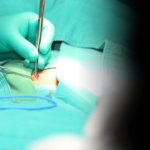
Hernias happen when an organ or tissue pushes through a weak spot in the muscle or tissue that holds it in place. Imagine a tire with a bulge – that’s kind of what a hernia is like. They most commonly occur in the abdomen (belly) and groin, but can happen anywhere in the body.
If you’re facing hernia surgery, it’s natural to have questions and concerns. This blog will walk you through what you should know about hernia surgery, from understanding the procedure to recovery tips.
Why Surgery?
While small hernias sometimes don’t cause problems, surgery is usually the recommended treatment. Here’s why:
- Strangulation: A strangulated hernia occurs when the bulging tissue gets trapped and loses blood supply. This can be serious and requires immediate surgery.
- Pain and Discomfort: Hernias can cause pain, especially during activities like lifting or straining. Surgery can help alleviate this discomfort.
- Enlargement: Hernias tend to get bigger over time, increasing the chance of strangulation and discomfort.
Types of Hernia Surgery
There are two main types of hernia surgery:
- Open Surgery: The surgeon makes a cut in the area where the hernia is and pushes the organ back into place. They may use stitches or surgical mesh to repair the weakened muscle wall. Mesh is a patch-like material that helps strengthen the area.
- Laparoscopic Surgery: This is a minimally invasive procedure where the surgeon makes a few small cuts and inserts tools with a camera to see the hernia. They then repair it using tiny instruments.
Before Surgery
Your doctor will discuss the type of surgery best for you based on the size and location of your hernia, your overall health, and your preferences. Here’s what to expect before surgery:
- Medical History: Be prepared to discuss your medical history, allergies, medications you take, and any previous surgeries.
- Physical Exam: Your doctor will examine the hernia and may order imaging tests like X-rays or ultrasounds to get a clearer picture.
- Preparation Instructions: You’ll likely be instructed to stop smoking, avoid certain medications, and fast for a specific time before surgery.
During Surgery
- Anaesthesia: You’ll receive anaesthesia to keep you pain-free during the surgery. This could be general anaesthesia (where you’re asleep) or regional anaesthesia (where only the area of the surgery is numbed).
- The Procedure: The type of surgery you have will determine the specifics, but generally, the surgeon will push the organ back in place, repair the weak spot, and possibly use mesh for reinforcement.
- Recovery Room: After surgery, you’ll be monitored in a recovery room until you’re awake and stable.
After Surgery
Whether you go home the same day (outpatient) or stay overnight (inpatient) depends on the type of surgery and your recovery. Here’s a general idea of what to expect:
- Pain Management: You’ll likely experience some pain or discomfort after surgery. Your doctor will prescribe pain medication to help manage this.
- Activity Restrictions: You’ll need to take it easy for a while, avoiding strenuous activities that could strain the repair site.
- Wound Care: The doctor will give you specific instructions on caring for your incision.
- Diet: You may need to follow a specific diet for a short time after surgery.
- Follow-up Appointments: Schedule follow-up appointments with your doctor to monitor your healing progress.
Recovery Tips
Here are some tips to promote a smooth recovery after hernia surgery:
- Rest: Get plenty of rest, especially in the first few days after surgery.
- Pain Management: Take your pain medication as prescribed by your doctor.
- Incision Care: Keep your incision clean and dry according to your doctor’s instructions.
- Gradual Activity: Slowly increase your activity levels as tolerated by your body. Walking is a great way to stay active during recovery.
- Diet: Eat a healthy diet with plenty of fruits, vegetables, and fibre to aid healing and prevent constipation.
- Lifting Restrictions: Avoid lifting heavy objects until your doctor clears you to do so.
- Listen to Your Body: Don’t push yourself too hard. Pay attention to your body’s signals and rest when you need to.
Possible Complications
As with any surgery, there are potential complications associated with hernia surgery. These include:
- Infection
- Bleeding
- Recurrence (hernia coming back)
- Mesh rejection (if used)
- Injury to nearby organs
Following Up
- Follow-up Appointments: Regular follow-up appointments with your doctor are crucial to monitor your healing and address any concerns. These appointments typically involve checking the incision site, assessing your pain level, and discussing any limitations you might have.
- Returning to Normal Activities: Your doctor will



